
Photo: Photosport
More than 300,000 tickets have been sold - or given away - to FIFA Women's World Cup matches in New Zealand, where rugby, league and netball are the dominant spectator sports.
So the odds are that many fans - eager to be part of one of the planet's biggest sporting events - will be watching the 'beautiful game' live for the first time.
But you know how football works, right? Of course you do.
There's a lot of running around after a round ball (players regularly clock up more than 10 kilometres during a match) while manipulating that ball with their feet, often as if it was magically attached to them.
Sometimes there's a bit of pushing, shoving and tripping (and more than occasionally someone will fall to the ground in an Oscar-winning performance), and when someone scores they run around the pitch like a possessed seven-year-old.
Fans sing songs and cheer incessantly (even hours before the match), shout at the ref and opposition players, but love their own team and fellow supporters unconditionally.
From Thursday, everyone in New Zealand is expected to become a football expert when the FIFA Women's World Cup kicks off.
If you want to keep up with the conversation, here's what you need to know.
What's the point of the game?
Let's not get too existential - life in 2023 is complicated enough. The object of a game of football, also known as soccer, is to score more goals than the opposing team (and to stop the opposing team from doing the same).
To do this, a team has to kick the ball into a goal - not over it - which is guarded by a goalkeeper. They're the only ones who are allowed to use their hands in a game, except for when they come outside of their penalty box. It's important to note in football, the whole of the ball must cross the whole of the line for a goal to be awarded. Luckily, we now have goal-line technology to take the guess work out of this.
How many people do you need to play?
Each team starts a game with 11 players, though numbers can vary during a match due to injury or players being sent off (we'll get to that). According to Football Association (FA) rules, a match cannot start, or continue, if either team has fewer than seven players (not much chance of that here). A team can name as many as 12 substitutes, but can only play five during regular time, with a sixth allowed if a match goes into extra time (see below).
How long is a football match?
Be prepared for the long haul. A football match lasts 90 minutes, so don't jump up at the 40-minute mark for that half-time hot-dog or you might miss a decisive moment. Each half lasts 45 minutes, plus time added on for breaks in play.
If a knockout match - anything beyond the group stage - is deadlocked at full-time, play continues for another 30 minutes. Still no winner... it's time for the dreaded penalty shootout (more on that later).
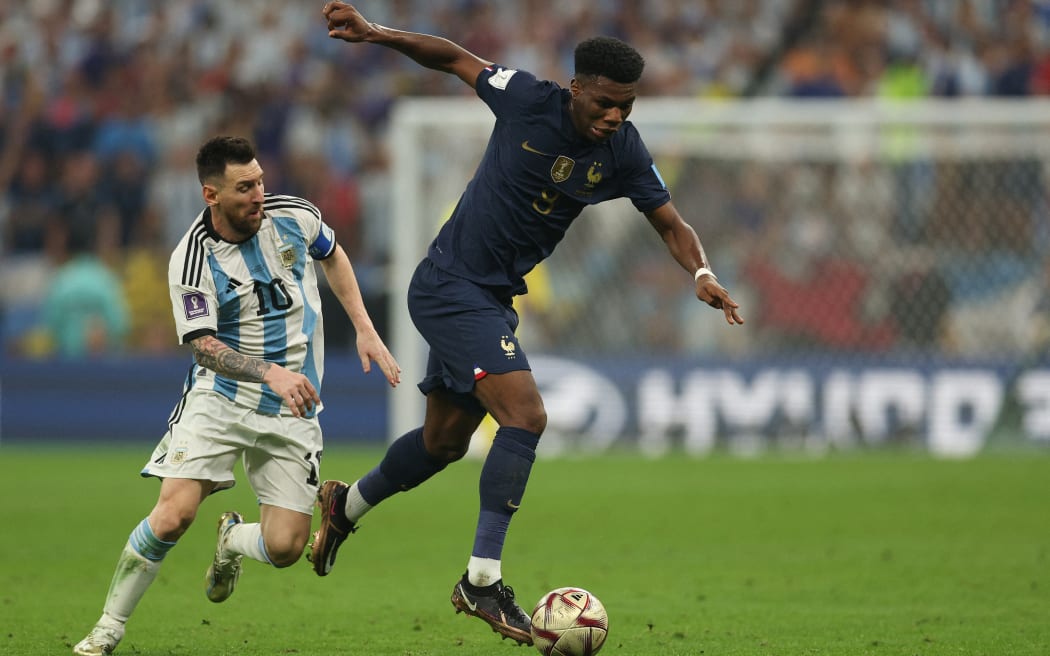
Argentina's forward Lionel Messi fights for the ball with France's midfielder Aurelien Tchouameni during the Qatar 2022 World Cup final. Photo: AFP
What's the offside rule?
A player is offside if any part of their head, body or feet (ie. the bits that can score) are in their opponent's half of the pitch and nearer to their opponent's goal than both the ball and the second-last opposition player (to account for the goalkeeper usually).
A player in an offside position at the moment the ball is played by a teammate is only penalised if they become actively involved in play.
And, of course, there are exceptions. You can't be offside from a throw-in, a goal kick or corner kick.
Confused? Moving right along...
What's VAR?
VAR (Video Assistant Referee) is football's version of league's Bunker or rugby's Television Match Official (TMO) and no less contentious.
Football came late to using video referees, the argument being it would spoil the flow of the game.
VAR can only be used to review goals including foul play leading up to and potential offsides, red cards, penalties and to clarify cases of mistaken identity.
Reviews can be instigated by the referee or the VAR team, and can only overrule a decision if there is a clear and obvious error (in theory at least). If there's any doubt, the referee can view a sideline monitor to make a decision.
It's not uncommon to hear fans chant 'V-A-R' hoping to get a decision against their team overruled.
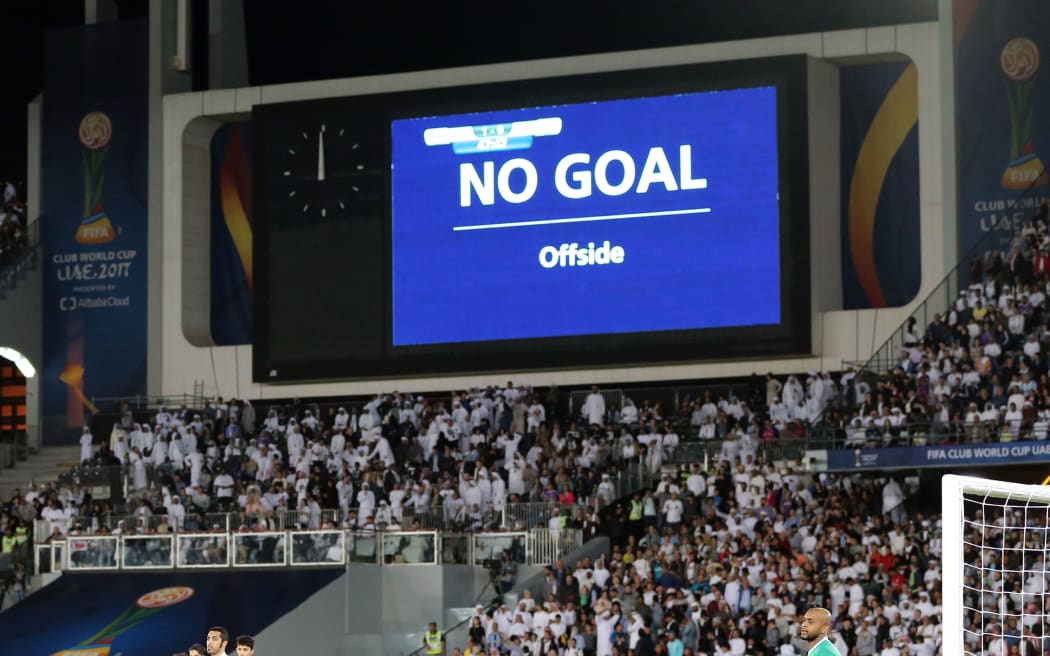
The introduction of the Video Assistant Referee has not been completely smooth in football. Photo: Photosport
What's the difference between red and yellow cards?
Most fouls in football are dealt with via a free kick (not a penalty, more on those later) but serious offences attract red or yellow cards.
If a foul is more likely to injure a player or stop a goal-scoring action, a referee can show a yellow card - which they write down in their notebook, hence why it's called a 'booking'.
A player who is ‘cautioned’ (issued a yellow card) can stay in the game, but if they reoffend and get a second yellow card, they will automatically also be shown a red card and be sent off. They can't be replaced.
If a referee believes a foul is even more serious, deliberate and liable to endanger an opposition player's health they can issue a straight red card, and the player is sent off and can't be replaced.
A player who is shown a red card - or two yellows in one match - is suspended for one match.
During the World Cup group stages, players are also suspended after third and fifth yellow cards and any subsequent yellow cards.
Yellow cards are scrubbed at the end of the group stages and the system reset.
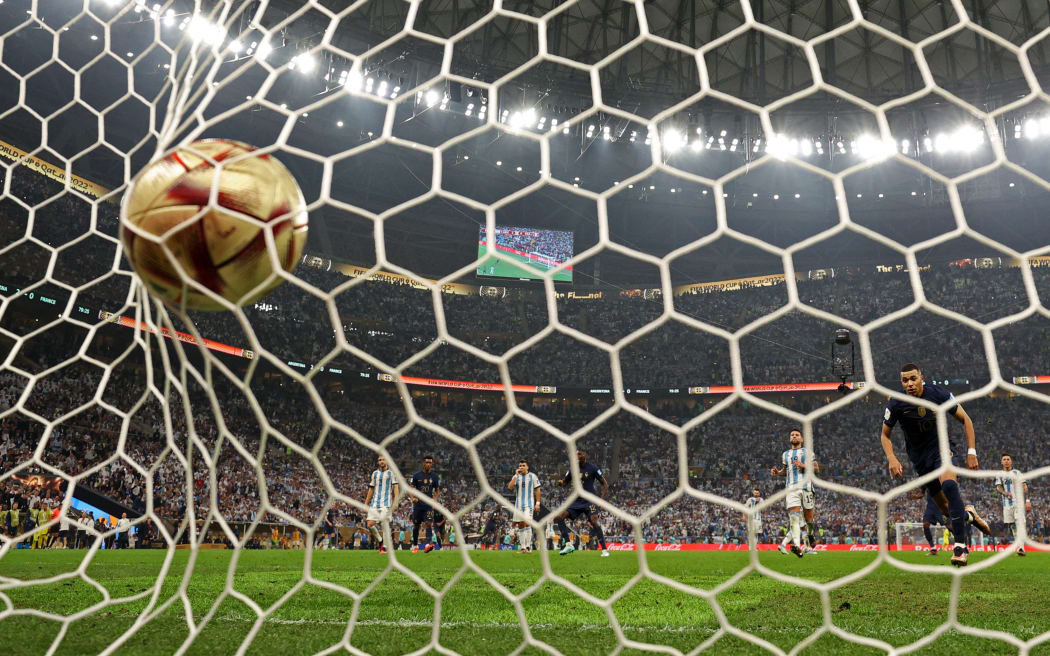
France's forward No. 10 Kylian Mbappe (second right) scores a penalty goal during the Qatar 2022 World Cup final football match against Argentina. Photo: AFP
What's a penalty?
This is where those Oscar-winning antics often come into play, although poor acting can itself result in a yellow card for 'simulation' - football's version of a Razzie.
A penalty is awarded when a player is fouled inside the opponent's penalty box.
The ball is placed on the penalty spot - about 11m from the goal line - and the player taking the penalty can score directly from it.
The goalkeeper cannot delay the taking of a penalty, but performing a jelly-legs jig is okay along as one foot is on or behind the goal line when the penalty is taken.
What's a handball?
Should be straightforward, right? Think again.
In football, handball comes in to play when the ball touches a player's arm/hand anywhere below the armpit. But not any such touch is an offence!
It's a handball when a player deliberately touches the ball with their hand or arm, for example moves their hand towards the ball.
It's also handball if a player touches the ball with their hand/arm when it has made their body unnaturally bigger, for example, when their hands are raised or outstretched.
If a player scores with their hand or arm - even if it's accidental - it's an offence. Similarly, if they score - seemingly legitimately - immediately after the ball has touched their hand/arm accidentally, it's still handball.
Goalkeepers can handle the ball, but only whilst inside their own penalty box.
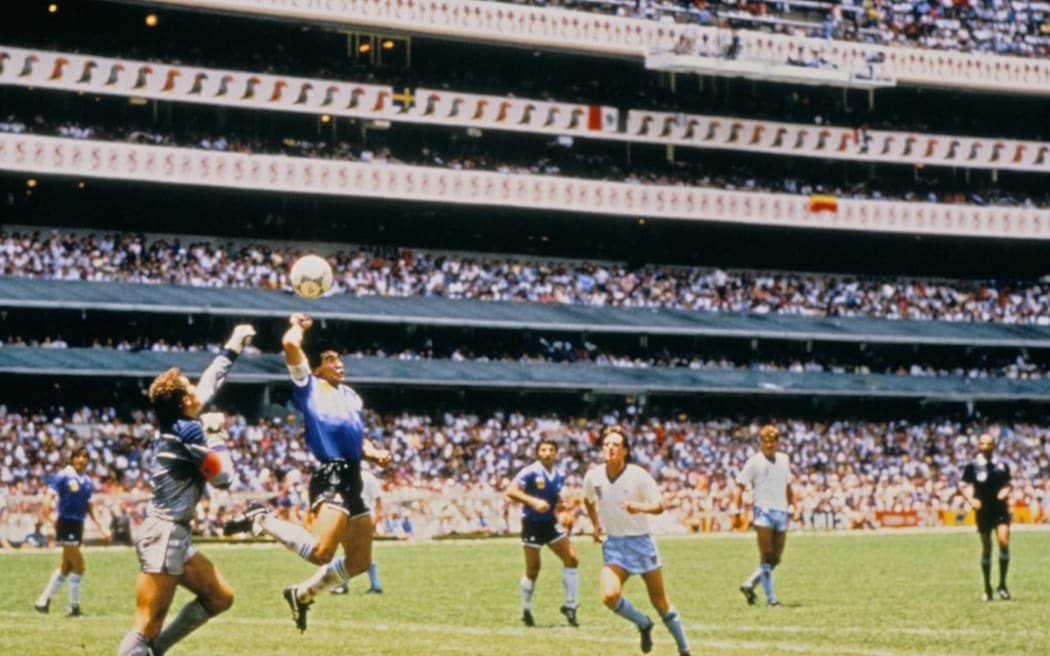
Diego Maradona scores with a handball, goal he later said "was the hand of God" against England in the 1986 World Cup. Photo: ANP
Why are football match scores so low compared to rugby, or netball, or basketball?
Goals, tries, and baskets win ball games, right?
In football you can only score by getting the ball into a goal 7.32 metres (24 ft) wide and 2.44 metres (8 ft) high.
Complicating matters are not only the 10 opposition outfield players trying to prevent that, but also a goalkeeper - usually standing about 1.82m or 6ft - who can use their hands as well their feet to prevent you scoring.
Football is low-scoring, but that's what makes goals so important and worth celebrating on the pitch or in the stands. Turn away for a second and you might have missed the one moment that decided the match.
Why do some players run around like aeroplanes or point to the sky after scoring a goal?
Goals are everything in football and hard to come by - just ask the Football Ferns - so when a player scores pretty much anything goes (apart from taking your shirt off - that will attract one of those yellow cards), and goal celebrations are a tradition in footballing cultures all around the world. Even the stiff-upper-lipped Brits let their guard down.
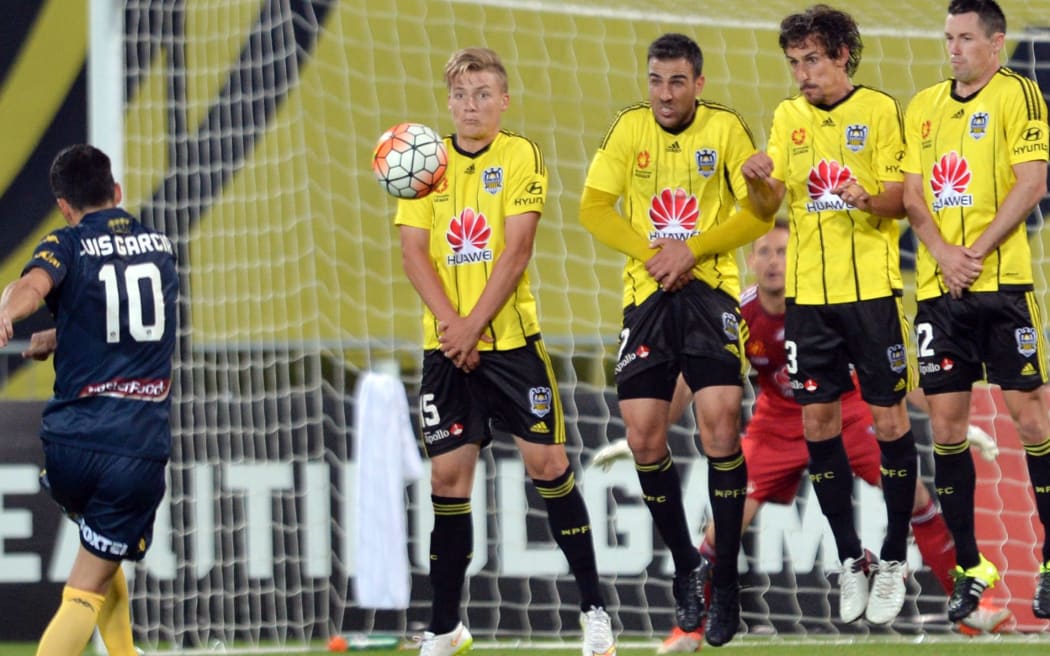
Luis Garcia of the Mariners shooting a free-kick and James McGarry, Manny Muscat, Albert Riera Vidal and Blake Powell of the Phoenix (L-R) reacting. Photo: PHOTOSPORT
Penalty shootouts
Penalty shootouts are synonymous with FIFA World Cups - just ask any English football supporter.
If a knockout stage match is tied after extra time, it's decided via a penalty shootout.
Each team selects five players and takes turns taking penalties until one team has an insurmountable lead.
If they are tied after five penalties, additional players take penalties in 'sudden death' mode until one team misses, and as a rule of thumb - in the men's game at least - Germany has won.
What do I do when I'm watching a game and have no idea what's happening?
The options are endless. You could look inscrutable, in the style of many coaches and managers (José Mourinho anyone?) or you could shout a lot ("REF!" will do when you don't know what else to say). If you're at a live match, you could take the opportunity to start a Mexican wave (beware that's usually a sign the match hasn't been much to write home about), or join in with the visiting fans from overseas and sing and chant until your lungs scream enough!

